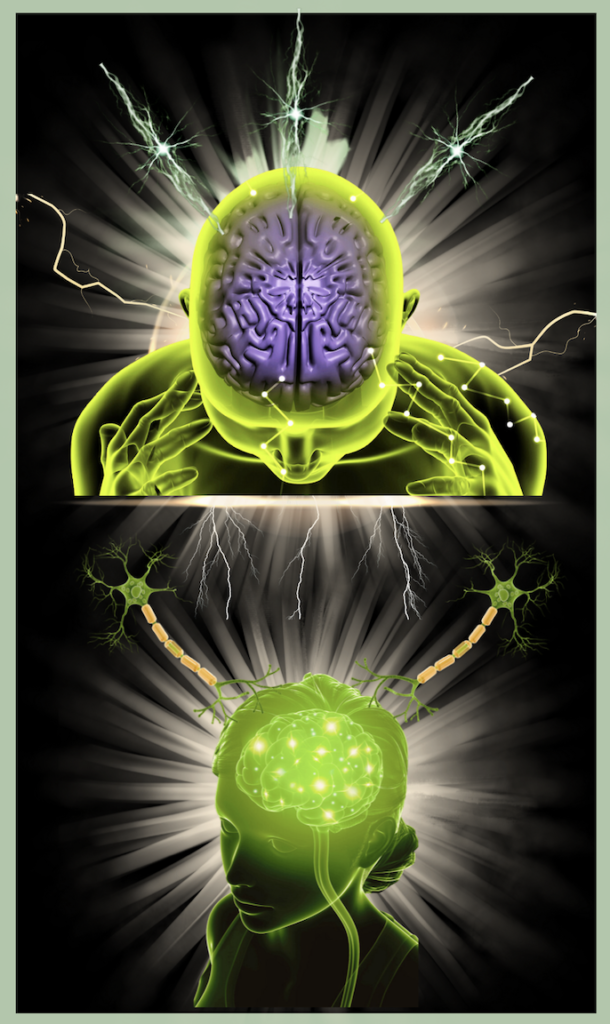
According to Dr. Peter Levine . . .
Founder of Somatic Experiencing
“The nervous system compensates for being in a state of self-perpetuating arousal by setting up a chain of adaptations that eventually bind and organize the energy into ‘symptoms’. These adaptations function as a safety valve to the nervous system. The first symptoms of trauma usually appear shortly after the event that engendered them. Others will develop over time.”
In the section below, you will find groups of symptoms that tend to show up in the order listed. This is, however, a generalization. Symptoms in the second group may well show up in the first stages. Symptoms in the second group may also show up along with symptoms in the third group, etc. Some symptoms could well be included in all lists. There is no fixed rule that determines which symptom the organism will chose to enlists, or when it will chose to enlist it.
According to Dr. Peter Levine . . .
Author Of In An Unspoken Voice & Waking The Tiger
“Not all of these symptoms are caused exclusively by trauma, nor has everyone who exhibits one or more of these symptoms been traumatized. The flu, for instance, can cause malaise and abdominal discomfort that is similar to trauma symptoms. However, there is a difference; symptoms produced by the flu generally go away in a few days. Those produced by trauma do not. The symptoms of trauma can be stable (ever-present), unstable (will come and go), or they can hide for decades. Generally, these symptoms do not occur individually, but in constellations.”
Explore the symptoms of shock trauma
- Group I
- Group II
- Group III
- Group IV
- Hyperarousal
- Constriction
- Dissociations (including denial)
- Feelings of helplessness
- Hypervigilance (being “on guard” at all times)
- Intrusive imagery or flashbacks
- Extreme sensitivity to light and sound
- Hyperactivity
- Exaggerated emotional and startle response
- Nightmares and night terrors
- Abrupt mood swings (e.g., rage reactions or temper tantrums)
- Reduced ability to deal with stress (easily and frequently stressed out)
- Difficulty sleeping
- Panic attacks, anxiety, and phobias
- Mental “blankness” or “spaciness”
- Exaggerated startle response
- Avoidance behavior (avoiding certain circumstances)
- Attraction to dangerous situations
- Frequent crying
- Exaggerated or diminished sexual activity
- Amnesia and forgetfulness
- Inability to love, nurture, or bond with others individuals
- Fear of dying, going crazy, or having a shortened life
- Excessive shyness
- Muted or diminished emotional response
- Inability to make commitments
- Chronic fatigue or very low physical energy
- Immune system problems and certain endocrine problems such as thyroid dysfunction
- Psychosomatic illness, particularly headaches, neck and back problems, asthma, digestive issues, spastic colon, and sever premenstrual syndrome
- Feelings of detachment, alienation, and isolation – “living dead”
- Diminished interest in life
- Feelings and behaviors of helplessness
- Reduced ability to formulate plans
What is different about the brain of someone who is
Suffering from Shock Trauma?
The "threat perception" system in their brain will likely be enhanced.
These individuals see/perceive danger where other individuals would see manageable situations.
The filtering system in the brain may not function properly.
For the person suffering from shock trauma, their attention “in the moment,” is drawn to input/information that other people would simply ignore or dismiss as irrelevant. This in turn, makes it very hard for the individual to focus on what IS important “in the moment.” So they are challenged to respond naturally and organically in ordinary situations.
The "self-sensing" part of their brain may be "blunted" or dampened down.
When a person experiences terror in a life-threatening situation . . . or when a person is witnessing something horrific, what they are feeling in their body is overwhelmingly distressing. Some people will turn to drugs and alcohol in an attempt to “dampen down” those feelings. Others will organically/naturally find a way to “dampen down” those feelings. In the process, they simply stop sensing themselves.
The result: These individuals also dampen feelings of pleasure, sensuality, excitement, connection to others, etc. Their overall sense of aliveness is dampened down. Their motivation to move forward in life is dampened down.
In short, these individuals often feel emotionally numb and have difficulty taking in the “simple pleasures” of life (like seeing two children playing or seeing a beautiful rose bush).
The perceptions of the person may be distorted.
Imagine that two people are shown an abstract picture or painting of some sort. The person who is not suffering from shock trauma might see two people dancing. The person who is suffering from shock trauma might see a child being beaten. There is a real loss of the ability to see things as they are and enjoy things as they are, because they see the trauma everywhere.
The capacity for imagination may be severely diminished. It may be very difficult for these individuals to imagine something pleasurable happening to them in the future.
If you cannot imagine something, it is VERY difficult to change your life. You have to have an image of where you need to go, to go somewhere. As a result, these individuals are often perceived as “unmotivated.”
The individual suffering from shock trauma may suddenly start behaving “as if” the traumatizing event is happening to them again, in the present moment (even though it is not).
When this occurs, the individual may not be able to make any mental connection between the past event and what is occurring in the present moment. A woman, for example, may not know that something her boyfriend said (in the present moment) made her feel as though she is being molested again. All she knows is that she is having all the feelings, in the present moment, that she had when she was being molested as a child by her uncle.
In these cases, stress hormones will be released. The person’s body will start responding “as if” whatever happened before is happening right now. What is important to understand is that the “time-keeping” part of the brain goes off-line. This is the part of the brain that tells a person “that was then” . . . “this is now”). So the person cannot distinguish the two events and their bodies respond accordingly.
When re-experiencing an overwhelming (traumatizing) event, activation in “Broca’s Area” (the speech center of the brain) is substantially diminished. In extreme cases there may not be any activation at all.
People will often appear “dumb-founded.” The person may be able to speak a few small words, but they cannot, for example, “explain” something to another person.
In extreme cases, the person may not be able to speak at all. This is why, although words may be very important in other kinds of therapeutic processes, they have much less value when helping someone suffering from shock trauma process the traumatizing event.

Continue exploring the topic of shock trauma
Main Page: Shock Trauma
Start with the basics: what everyone should know about shock trauma.
Causes
The causes of shock trauma, according to Dr. Levine, can be divided into two main categories.
Bodyworker Tips
“Red Lights” For Bodyworkers:
recognizing the signs of unresolved shock in the physiology
